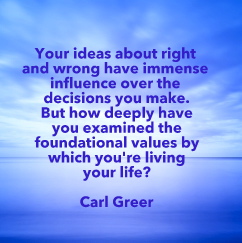Your Ideals and Choices: Questioning Your Beliefs

Your ideas about right and wrong have immense influence over the decisions you make. But how deeply have you examined the foundational values by which you are living your life? How can you discover what those values truly are? Questioning your beliefs could involve an exploration of how you would feel in hypothetical situations that pose painful ethical challenges. Although thinking about such situations can be uncomfortable, it is a way to uncover your true core values.
Suppose you have enough water for you, your spouse, and/or your children to survive for six months. During this period, there’s a 50-50 chance you’ll be given more, and you know the water supply will return in six months. Meanwhile, other people around you are dying of thirst, and they beg you for water. Would you sacrifice water for them?
What if the person asking was a good friend, a sibling, or a parent? How willing would you be to share something so vital when life and death are in the balance?
How do your ideal values and instincts for survival coexist? Where do your loyalties lie?
Maybe you resist the premise of this ethical challenge, and you hold on to the belief that there must be a creative solution that allows everyone to have water.
Some choices can come home to roost: they are not merely hypothetical. Even though the choice posed in the above scenario may seem unlikely to materialize, it–or one like it–could happen. Our loyalties get divided. There are times when you have to make difficult choices. Will your ideals and religious beliefs hold up when you have to make those choices?
Often, our beliefs have gone challenged. We live according to the same old story we always have, never reflecting on why we think, feel, and act as we do, unaware that we have the power to change our story to a better one. When someone we care about does something that brings our beliefs into question, we may revisit and struggle with what we believed wholeheartedly for a lifetime. It may not have occurred to us that someday we would have to examine that belief.
Think about an unquestioned belief that you hold. Imagine a situation that would cause you to question that belief. How might your belief change?

You can learn more about transformation and how to change your story and your life by reading my books, including my latest, Go Within to Change Your Life: A Hidden Wisdom Workbook for Personal Transformation. They’re available at bookstores everywhere.
